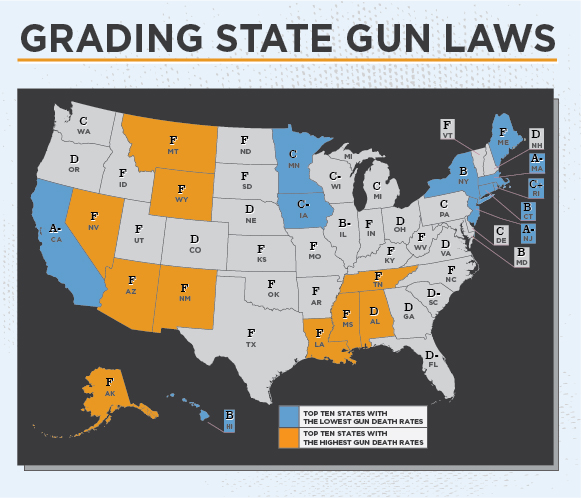States with the Strictest Gun Laws

What are the strictest states for gun laws?
California
California has some of the strictest gun laws in the country, with a focus on preventing gun violence. The state requires background checks for all gun purchases, with a 10-day waiting period. It also prohibits the sale and possession of certain types of firearms, including assault weapons and large-capacity magazines. Additionally, California has a red flag law, allowing law enforcement to temporarily confiscate guns from individuals who pose a threat to themselves or others.
Connecticut
Connecticut has strict gun laws, including a ban on assault weapons and large-capacity magazines. The state also requires permits for all gun purchases, with a background check and a waiting period. Connecticut has a red flag law, allowing law enforcement to temporarily remove firearms from individuals who pose a threat to themselves or others.
Hawaii
Hawaii has strict gun laws, including a permit requirement for all gun purchases, with a background check and a waiting period. The state also prohibits the sale and possession of assault weapons and large-capacity magazines. Additionally, Hawaii has a red flag law, allowing law enforcement to temporarily confiscate guns from individuals who pose a threat to themselves or others.
Illinois
Illinois has some of the strictest gun laws in the country, including a permit requirement for all gun purchases, with a background check and a waiting period. The state also prohibits the sale and possession of assault weapons and large-capacity magazines. Additionally, Illinois has a red flag law, allowing law enforcement to temporarily confiscate guns from individuals who pose a threat to themselves or others.
Massachusetts
Massachusetts has strict gun laws, including a permit requirement for all gun purchases, with a background check and a waiting period. The state also prohibits the sale and possession of assault weapons and large-capacity magazines. Additionally, Massachusetts has a red flag law, allowing law enforcement to temporarily confiscate guns from individuals who pose a threat to themselves or others.
Why do states have strict gun laws?
States with strict gun laws have implemented regulations in an effort to prevent gun violence and increase public safety. These regulations may include background checks and waiting periods for gun purchases, a ban on certain types of firearms, and red flag laws. The goal is to keep guns out of the hands of individuals who may pose a threat to themselves or others.
Advantages and Disadvantages of Strict Gun Laws
| Advantages | Disadvantages |
|---|---|
| Reduced gun violence | Restriction on personal freedom |
| Increased public safety | May not stop all gun violence |
| Prevention of gun-related suicides | May lead to black market gun sales |
FAQs
What is a red flag law?
A red flag law allows law enforcement to temporarily confiscate guns from individuals who pose a threat to themselves or others. This can include individuals who have made threats or exhibited concerning behavior.
Do strict gun laws violate the Second Amendment?
There is ongoing debate about the extent to which gun laws may infringe on Second Amendment rights. Some argue that strict gun laws violate the right to bear arms, while others believe that regulations are necessary for public safety.
Which state has the most lenient gun laws?
States with more lenient gun laws may allow for open carry, permitless carry, and fewer regulations on firearms. Some states with more lenient gun laws include Arizona, Alaska, and Texas.
Do strict gun laws prevent all gun violence?
While strict gun laws may reduce gun violence, they may not prevent all instances of gun violence. Individuals who are intent on committing acts of violence may find ways to obtain firearms through illegal means.
Overall, states with strict gun laws have implemented regulations in an effort to prevent gun violence and increase public safety. These regulations may include background checks and waiting periods for gun purchases, a ban on certain types of firearms, and red flag laws. While there is ongoing debate about the extent to which gun laws may infringe on Second Amendment rights, strict gun laws have the potential to reduce gun violence and increase public safety.
